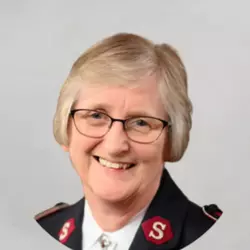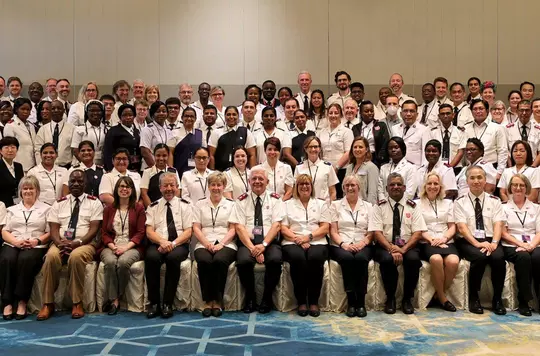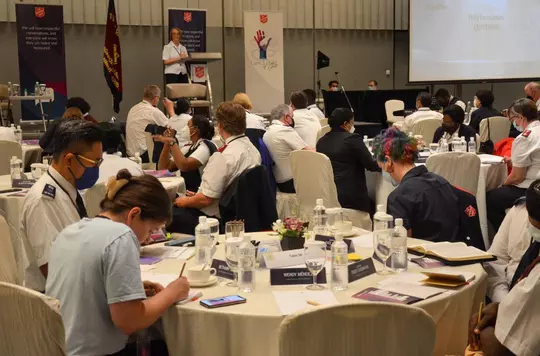30 January 2023
Living with difference: What is good disagreement?
Lieut-Colonel Karen Shakespeare

Lieut-Colonel Karen Shakespeare considers how harmony reveals the richness of God’s Kingdom.
In Romans 12:16 we glimpse a vision of the Kingdom of God. Musical harmonies are created when notes are played creatively in relationship with one another, creating a sound that is fuller and more beautiful than any note on its own. As an image of God’s people, harmony speaks of a church that reveals the richness of life in God’s Kingdom and where diversity and difference are recognised and valued. We are all uniquely created by God and have received the gift of free will.
We make choices every day; some are insignificant but others will shape our lives, our relationships and our lives with God. Other people make different choices. This is not necessarily a problem; it is how we deal with the difference that is important, otherwise there can be toxic consequences.
As Christians we all have our ‘line in the sand’. We know these things are important to us and the acceptable limits of our own and other people’s beliefs and actions. We also know that other people may think and behave differently from us, and so there is not just one line in the sand, but multiple lines that cross and intermingle, and living and serving alongside those who draw the line in a different place can be challenging.
So how can Christians live in harmony, while at the same time acknowledging – but not minimising or trivialising – our diversity? How do we serve God in partnership with our faithful and sincere Christian friends when we disagree about important issues at a deep level?
The history of the Church shows that, ever since the debate in the book of Acts (see Acts 10, 11 and 15) about including the Gentiles in the fledgling community, faithful, committed, Spirit-led Christians have not agreed on every matter. Nor have we always negotiated our differences with grace and honesty. Yet when we learn to live in harmony despite our differences, we model attractive and countercultural relationships that speak to the world of Jesus.
How can we learn to disagree well, in a spirit that honours both truth and grace, so that we can live together in unity, if not unanimity?
Good disagreement is not a search for agreement, nor is it winning the argument. It begins when we are determined to preserve our relationships with those with whom we disagree, recognising each other as brothers and sisters in Christ, despite our differences. It requires a commitment to be curious about other people’s perspectives, to listen carefully with a loving heart and a mind that is open to new possibilities, even when we are totally convinced that we are right. It allows us to build relationships of trust with other people, even when we disagree profoundly.
Good disagreement is not an optional extra for Christians. It is required by our faith. No matter what we disagree about, or with whom we disagree, we must do it in a godly way.
It can be exhausting as we listen carefully to other people while at the same time ensuring that we express our own views appropriately, especially if the subject is important to our own life of faith. Good disagreement is what we are called to do. It isn’t easy and most of us fail, sometimes spectacularly, at times.
In Let Us Dream: The Path to a Better Future, Pope Francis suggests that as Christians think and pray together it is possible to learn to appreciate aspects of truth in views that are different from our own and to find a way forward that transcends those things that would divide us. He believes that when differences are expressed and explored with openness and in depth it is possible to discover a harmony that is a gift of the Holy Spirit. It is not consensus or compromise, but is rich, complex and unexpected, holding on to the sharp notes of its differences.
Perhaps this is the harmony of Romans 12:16; the harmony that is a mark of love, and of Christian living.
Written by

Lieut-Colonel Dr Karen Shakespeare
Chair of the International Theological Council and Tutor at William Booth College
Discover more

Lieut-Colonel Jayne Roberts reflects on her experience of being a UKI delegate at IHQ's Symposium on Human Sexuality.

Bethany Gibson reflects on her experience of being a UKI delegate at IHQ's Symposium on Human Sexuality.

As the Week of Prayer for Christian Unity invites us to consider racial injustice, Lieutenant Nazia Yousaf encourages us to be inclusive.

Commissioner Gillian Cotterill encourages us to follow the good Samaritan’s example.